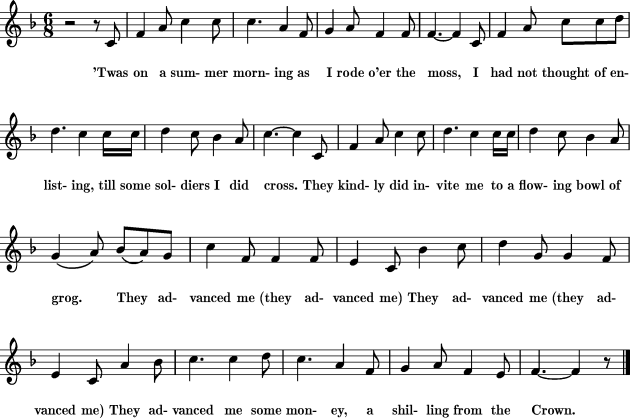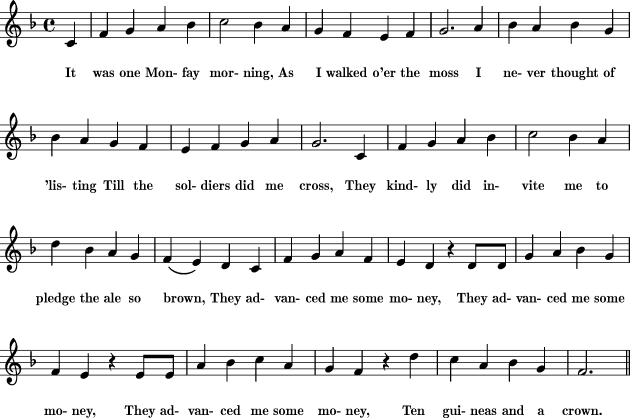Subject: Origins: The White/Blue/Green Cockade
From: Joe Offer
Thread #9379 Message #2967786
Posted By: GUEST,Gentle Gaint
18-Aug-10 - 08:51 AM
Thread Name: English Folk Songs
Subject: ADD Version: The White Cockade
Does anyone know the origin of a folk song called "The White Cockade".
It's one of my favorites.
THE WHITE COCKADE
One day as I was walking all o'er yon fields of moss,
I had no thoughts of enlisting till some soldiers did me cross,
They kindly did invite me to a flowing ball and down,
They advanced, they advanced me some money,
A shilling from the crown.
My true love he is handsome and he wears a white cockade,
He is a handsome young man, likewise a roving blade,
He is a handsome young man, he's gone to serve the King,
Oh my very, oh my very,
Heart is aching all the love of him.
My true love he is handsome and comely for to see,
And by a sad misfortune a soldier now is he,
I wish the man that's listed him might prosper night nor day,
And I wish that, I wish that,
The hollanders might sink him in the sea.
Then he took out his hankerchief to wipe my flowing eye,
Leave off your lamentations likewise your mournful sighs,
Leave off your grief and sorrow until I march o'er yon plain,
We'll be married, we'll be married,
In the springtime when I return again.
My true love he is listed and it's all for him I'll rove,
I'll write his name on every tree that grows in yonder grove,
My poor heart it does hallow, how my poor heart it does cry,
To remind me, to remind me,
Of my ploughboy, until the day I die.
Kate Rusby sings lyrics similar to this: https://www.youtube.com/watch?v=7Lgw_8kapmQ
Here's the Traditional Ballad Index entry:
Summer Morning, The (The White/Blue/Green Cockade)
DESCRIPTION: "It was one summer morning, as I went o'er the moss, I had no thought of 'listing till the soldiers did me cross." But her love is in the army. She both laments and curses him. They meet; he dries her tears and says he will return; she vows to rambleAUTHOR: unknown
EARLIEST DATE: 1820 (Kidson's mother according to Kidson-Tunes); 1846 (Dixon-Peasantry)
KEYWORDS: soldier love separation recruiting
FOUND IN: Britain(England(North,South))
REFERENCES (9 citations):
Dixon-Peasantry, Song #34, pp. 229-230, "The Summer's Morning" (1 text)
Bell-Combined, pp. 449-451, "The Summer's Morning" (1 text)
Kidson-Tunes, pp. 113-115, "The Summer Morning"; p. 115, "The White Cockade" (1 texts plus 1 fragment, 3 tunes)
Stokoe/Reay, pp. 68-69, "It Was One Summer Morning" (1 text, 1 tune)
Wiltshire-WSRO Wt 517, "Blue Cockade" (1 text)
CopperSeason, pp. 282-283, "The White Cockade" (1 text, 1 tune)
RoudBishop #20, "The White Cockade" (1 text, 1 tune)
DallasCruel, pp. 30-31, "The White Cockade" (1 text, 1 tune)
DT, COCKADE1*
Roud #191
File: StoR068
Go to the Ballad Search form
Go to the Ballad Index Song List
Go to the Ballad Index Instructions
Go to the Ballad Index Bibliography or Discography
The Ballad Index Copyright 2018 by Robert B. Waltz and David G. Engle.
WHITE COCKADE (THEY ADVANCED ME)
'Twas on a summer's morning as I rode o'er the moss,
I had no thought of enlisting, till some soldiers did me cross.
They kindly did invite me to a flowing bowl of grog
They advanced me (they advanced me)
They advanced me (they advanced me)
They advanced me some money, a shilling from the crown.
Oh yes, my love's enlisted and he wears a white cockade,
He is a handsome young man, a rash and roving blade.
He is a handsome young man, and he's gone to serve his king
Oh! my very (Oh! my very)
Oh! my very (Oh! my very)
Oh! my very heart is aching all for the love of him.
As I roved out one morning, as I wandered o'er yon lea,
My love was tall and handsome, but a soldier now is he
I hope the man that 'listed him may suffer night and day.
How I wish that (How I wish that)
How I wish that (How I wish that)
How I wish that the Hollanders would sink him in the sea.
Oh may he never prosper, and may he never thrive
On anything he turns his hand as long as he's alive.
May the very ground he treads on, the grass refuse to grow
'Cause he's been the ('Cause he's been the)
'Cause he's been the ('Cause he's been the)
'Cause he's been the only cause of my sorrow,grief and woe.
Then he took out his handkerchief and wiped her flowing eye,
Leave off your lamentations, likewise your mournful cries.
Leave off your lamentations while I march o'er the plains,
We'll be married (We'll be married)
We'll be married (We'll be married)
We'll be married in Newcastle when I return again.
Oh yes, my love's enlisted, and for him I will rove
And carve his name on every tree that buds in yonder grove.
The huntsman he will holler and the hounds will loudly cry
To remind me (To remind me)
To remind me (To remind me)
To remind me of my ploughboy until the day I die.
@recruit @war @love
filename[ COCKADE1
TUNE FILE: COCKADE1
CLICK TO PLAY
RG

THE SOLDIER'S FAREWELL (White Cockade II)
It was one Monday morning
As I walked o'er the moss,
I never thought of 'listing,
Till the soldiers did me cross;
They kindly did invite me to pledge the ale so brown,
They advanced me some money,
They advanced me some money,
They advanced me some money,
Ten guineas and a crown.
Then, as I wore the white cockade
I marched into the town
To bid farewell to all my friends
Before I did go down,
Beneath a shady willow I saw my sweetheart lay
Upon a mossy pillow (3x)
And heard her, sighing, say:
'Tis true my love is 'listed
And he wears a white cockade.
He is a handsome young man
Besides a roving blade;
He is a handsome young man, he is gone to serve the king
My very heart is breaking (3x)
All for the love of him.
Oh, may he never prosper
Oh, may he never thrive,
Nor anything he takes in hand
As long as he's alive;
May the ground he treads fall under him, the grass he bends ne'er grow
Since he has gone and left me (3x)
In sorrow, grief and woe.
I pulled out my handkerchief
And wiped her flowing tears.
O, take this in remembrance
And calm your groundless fears,
And keep you in good company while I march o'er the plain,
Then I'll be married to my love (3x}
When I return again.
From Room for Company, Palmer
@soldier @parting @recruit
filename[ COCKADE2
TUNE FILE: COCKADE2
CLICK TO PLAY
RG
oct96
